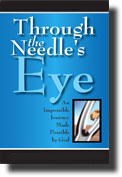 All of the links below will take you to consecutive chapters of a book by David A. Servant titled, Through the Needle’s Eye: An Impossible Journey Made Possible by God. Most readers will be greatly challenged by the content of these chapters as they discover how Jesus’ words regarding stewardship are often ignored or twisted. For that reason, it is best to read the book in the order that the chapters are listed, beginning with the Introduction. Readers whose Lord is Jesus will find great joy in obeying what Jesus said regarding stewardship, although they may certainly struggle at first to accept what clearly goes against the tide of materialistic culture.
All of the links below will take you to consecutive chapters of a book by David A. Servant titled, Through the Needle’s Eye: An Impossible Journey Made Possible by God. Most readers will be greatly challenged by the content of these chapters as they discover how Jesus’ words regarding stewardship are often ignored or twisted. For that reason, it is best to read the book in the order that the chapters are listed, beginning with the Introduction. Readers whose Lord is Jesus will find great joy in obeying what Jesus said regarding stewardship, although they may certainly struggle at first to accept what clearly goes against the tide of materialistic culture.
Introduction How can we prepare our hearts to receive Jesus’ commandments regarding stewardship? Is guilt a bad thing and from Satan as so many professing Christians think? What is the difference between conviction and condemnation?
Chapter 1: The Death of a Wealthy Fool In this chapter, greed and covetousness are defined, and Jesus’ Parable of the Rich Fool is considered in detail. The rich fool in Jesus’ story is very much like many professing Christians who are materially wealthy yet not “rich toward God.”
Chapter 2: Jesus Loves a Rich, Young Ruler This chapter and the next expose the fallacies of many modern interpretations that distort the clear implications of the story of the rich, young ruler. Jesus plainly said it is hard for the rich to enter the kingdom of heaven, and the clear reason is because, like the rich ruler, they find it so hard to repent of their greed. Jesus’ words to the rich ruler help us truly understand what it means to be saved by grace through faith.
Chapter 3: Jesus Loves a Rich, Young Ruler, Part 2 Make sure you’ve read the previous chapter, as this chapter is a continuation of that one. The rich, young ruler had no doubts about Jesus’ demands for salvation.
Chapter 4: A Steward, a Rich Man and a Beggar This chapter takes a close look at Jesus’ Parable of the Unfaithful Steward and His story of the Rich Man and Lazarus, both spoken to the same audience in a single sermon. What did Jesus mean when He told His followers to “make friends by the means of unrighteous mammon”? Why did the rich man, once in hell, request that Lazarus, of all people, relieve his sufferings in a minuscule way?
Chapter 5: Lay Not Up For Yourselves Treasures Almost one-fourth of everything Jesus taught in His Sermon on the Mount had something to do with money and possessions. Jesus told all of us to not lay up treasures on earth, and if we do, we reveal that we aren’t true lovers of God. How can we know if we are obeying Jesus in this regard? And what did He mean about having an evil eye and a body full of darkness?
Chapter 6: The Deceitfulness of Riches In Jesus’ parable of the Sower and the Soils, He again warned that riches can deceive people, keeping them out of the kingdom of God, and even cause true believers to ultimately forfeit their salvation. Many such people will be shocked on the day of their judgment as they are categorized not as sheep, but goats, and cast into hell.
Chapter 7: A Worthless Slave Does the potential exist that a born again individual may not be ready for Christ’s coming and be cast into hell? Yes. Jesus’ Parable of the Talents is a dire warning to every Christian about the stewardship of his time, talents and treasures.
Chapter 8: Jesus and Stewardship This chapter considers numerous other passages in the four Gospels regarding stewardship that have not been considered in the previous six chapters.
Chapter 9: The Early Church Follows Jesus The apostles followed Jesus’ commandment to makes disciples, teaching those disciples to obey all that He had commanded them, including everything He commanded them regarding stewardship. This chapter considers the apostles’ teaching as recorded in the book of Acts and the New Testament epistles.
Chapter 10: My Journey David shares his personal struggles and progress since he began to take seriously what Jesus taught about stewardship.
Chapter 11: The Old Testament View A survey of hundreds of Old Testament scriptures that are relevant to the topic of stewardship. Do the Old and New Testaments disagree?”

